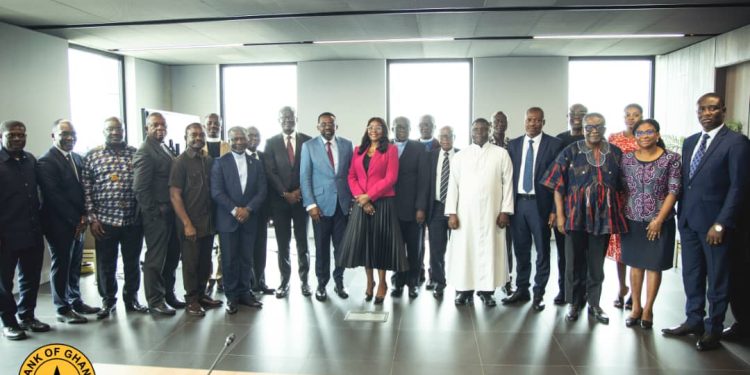Bank of Ghana Engages Clergy to Lay Foundation for Non-Interest Banking Rollout
The Bank of Ghana (BoG) has begun a series of stakeholder consultations with religious leaders, aiming to build consensus around the institutional and regulatory framework required to implement Non-Interest Banking and Finance (NIBF).
Addressing members of the clergy in Accra, BoG Governor Dr Johnson Asiama described the initiative as a “critical cornerstone” of broader financial sector reforms intended to promote ethical finance and deepen access to financial services across underserved populations.
“The Bank considers stakeholder engagement with the clergy as an important cornerstone for the effective rollout of NIBF governance that will reflect the interest and sensitivity of Ghanaians,” said Dr Asiama.
Infrastructure financing under pressure
As part of the consultations, the Governor reiterated the country’s pressing infrastructure financing needs estimated by the United Nations at US$37.9bn annually, and pointed to Sukuk, a Sharia-compliant bond structure, as a credible alternative to conventional debt.
“In the face of fiscal constraints, innovative instruments such as Sukuk bonds offer a credible alternative to conventional debt,” he said.
Sukuk bonds differ from traditional bonds in that they are asset-backed and based on profit-sharing rather than interest payments, aligning with Islamic finance principles. Several African economies, notably Nigeria and South Africa, have turned to Sukuk to fund critical infrastructure, raising billions of dollars in the process.
South Africa issued a $500mn debut Sukuk in 2014, followed by a $1.1bn issuance in 2023. Nigeria, since 2017, has raised the equivalent of $2.37bn, channelled into road and bridge infrastructure.
Institutional framework in focus
The BoG’s current engagement with religious leaders is part of a broader nationwide consultation process, which seeks to shape a culturally sensitive and ethically grounded rollout of the NIBF regime.
Dr Asiama noted that the clergy’s influence in shaping public understanding of financial models made them strategic partners in addressing misconceptions around non-interest banking.
The central bank aims to design a regulatory environment that supports instruments such as Mudarabah (profit-sharing partnerships) and Ijarah (leasing agreements), and restricts investments in sectors deemed unethical, including alcohol, gambling, and arms.
The Governor said NIBF would reinforce responsible investment, asset-backed lending, and enhanced transparency — elements that could help mitigate moral hazard risks and improve the alignment between financial intermediation and the real economy.
“This model enhances accountability, discourages moral hazard, and supports real economic activity,” Dr Asiama remarked.
Global trend with local implications
Ghana’s move aligns with a broader trend among both emerging and advanced economies to incorporate ethical and Sharia-compliant financial systems into their financial ecosystems. According to the BoG, global non-interest banking assets surpassed US$5.5tn by end-2025.
Several jurisdictions — including the UK, Malaysia, Singapore, and the Netherlands — have adopted regulatory frameworks for non-interest finance, enabling them to access Islamic capital markets and diversify financial intermediation models.
Across Africa, Nigeria, Kenya, Uganda, Tanzania, and South Africa have institutionalised NIBF structures to enhance financial inclusion, particularly among unbanked populations.
Dr Asiama stressed that successful adoption in Ghana would depend not only on regulation but on societal ownership, adding that the clergy must play an advocacy role in creating awareness and demystifying ethical finance principles.
“This is our shared responsibility — one that demands inclusiveness, trust, and ethical commitment,” he said.








